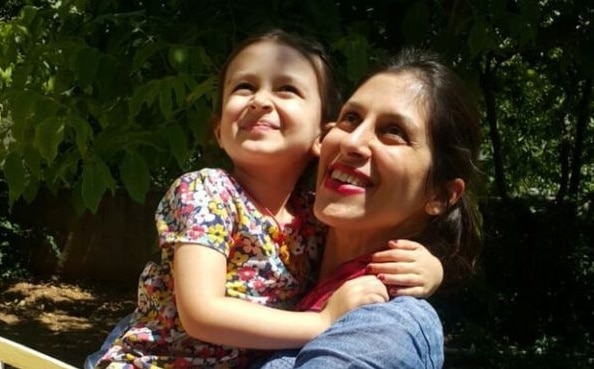Nazanin Zaghari-Ratcliffe and her daughter Gabriella (File)
Anglo-Iranian charity worker Nazanin Zaghari-Ratcliffe has ended a two-week hunger strike in an Iran prison.
Zaghari-Ratcliffe’s husband Richard said he had spoken with her on Saturday:
She’s decided to stop her hunger strike,” he said. “She said that in fact she’d had some breakfast this morning.
Ratcliffe is also ending his hunger strike, as he stayed in a tent outside the Iranian Embassy in London. He said the protest had raised the profile of Nazanin’s case: “In Iran, we’ve become a much bigger story than we were before and there’s an awareness that really this needs to be solved.”
See also Iran Daily, June 18: Political Prisoner Zaghari-Ratcliffe Begins Hunger Strike
Ratcliffe said at the start of the hunger strike that there was a limit: “We are both parents to [5-year-old daughter] Gabriella and obviously it’s important that this doesn’t go to the bitter end.”
He said on Saturday, after hearing that Nazanin had eaten porridge and fruit “I’m relieved because I wouldn’t have wanted her to push it much longer…..It was getting hard for me but I’m sure it was much harder for her.”
Ratcliffe explained, “She’d obviously been under quite a lot of pressure from the Revolutionary Guards, so [it was] quite stressful to break [the strike].”
He said he expected Nazanin to go to the prison clinic as soon as possible for a blood test.
From Charity Worker to Political Prisoner
Zaghari-Ratcliffe, a project manager with the Thomson Reuters Foundation, was arrested in April 2016 at a Tehran airport, after she and Gabriella had visited family. The charity worker was immediately detained in Tehran’s Evin Prison, and Gabriella’s passport was seized — she is still with her grandmother in the Iranian capital.
Zaghari-Ratcliffe was sentenced to five years in prison on “espionage”. No substantial evidence was ever publicly presented in the case, but subsequent State TV “documentaries” tied the prosecution to Zaghari-Ratcliffe’s employment for BBC Media Action in 2009-2010.
The BBC project trains journalists overseas. However, the Iranian regime, which has long pressed BBC Persian by harassing and threatening its staff and their relatives, converted Zaghari-Ratcliffe’s administrative post into one of developing reporters to seek the overthrow of the Islamic Republic amid mass protests over the disputed 2009 Presidential election.
Earlier this year Zaghari-Ratcliffe and fellow political prisoner Narges Mohammadi, of the Iranian Center for Defenders for Human Rights, went on hunger strike until Iranian authorities finally gave them access to essential medical care.
In late April, Iranian Foreign Minister Mohammad Javad Zarif raised the prospect of a swap of Zaghari-Ratcliffe for Iranians held in US prisons, but he was immediately pulled back by other regime factions.

